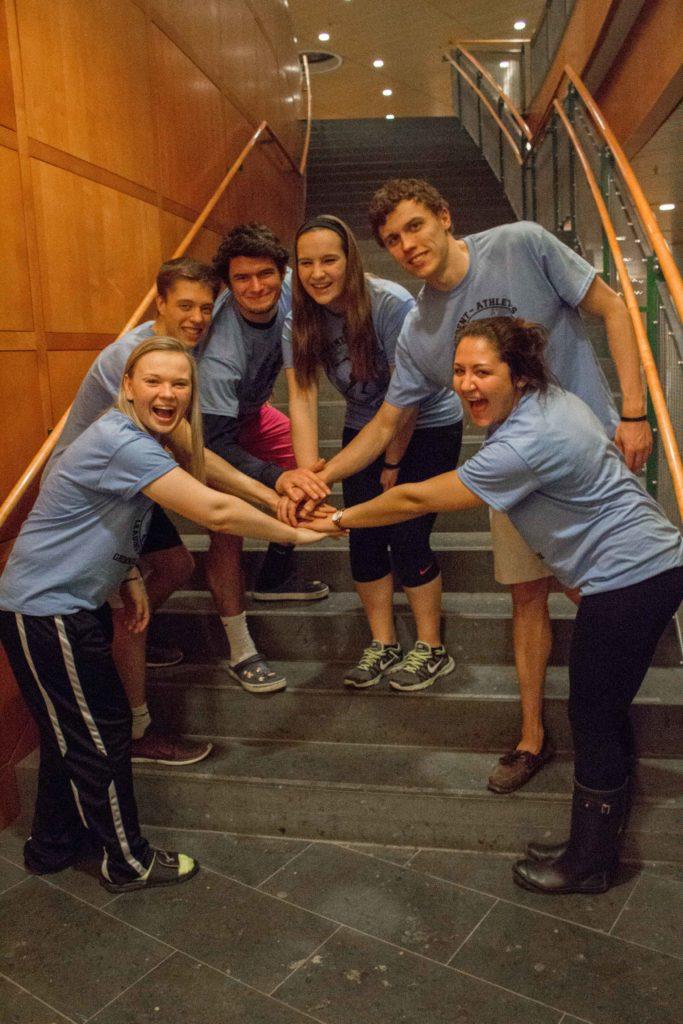By Jon Sundby
sundbyjo17@grinnell.edu
The College’s department of athletics has always prided itself on producing well-rounded student athletes. Whether a part-time musician, scholar or thespian, the athletes at Grinnell work hard to be a multi-dimensional part of our community. One of the ways they do this is through the organization Student Athletes Leading Social Change (SALSC), a young group on campus that is looking to place athletes in volunteer and advocacy roles.
The group was founded by Ariel Keller ‘17, a member of the women’s basketball team, who was both inspired by the work of other student athletes across the country and aware of the unique challenges that civic-minded Grinnell student-athletes faced. Due to inflexible practice times and large academic workloads, Keller explained that it was hard to find ways to help better the community.
“After attending a longer, week long service project with other student athletes from across the US … I was motivated to do something similar at Grinnell, at a micro level. To have a platform for athletes to engage with the community,” Keller said. “Since our practices run from 4-7, there’s not a lot of time to volunteer after that, since a lot of volunteer organizations meet after classes … so we wanted something that you could commit to, but it wouldn’t be too much to balance school, athletics and engagement with the community.”
Athletes are already required by the College and the National Collegiate Athletic Association (NCAA) to complete service hours, but Keller and her co-chair, Daria Guzzo ‘19, say that these hours are mostly funneled into a couple of projects per semester, usually organized by the athletic department.
“If you want to do more it’s kind of hard in that realm, so I think the group gives a nice opportunity to be continuously giving back in some capacity,” Guzzo said.
SALSC usually tries to focus on a couple big projects per semester, then supplement these programs with several smaller activities that occur more often. Their two projects this semester were teaming up with Advocates to help organize Sexual Assault Awareness Week and to host a field day for local children where they can work on their athletic skills with Grinnell athletes. The SALSC committee, which currently has around thirty active members, decided to divide the group and have each person focus their energies upon whichever project they felt passionately about.
In addition to their collaboration with Advocates, the group helped organize an awareness walk around campus last semester, which informed participants about the reality of sexual assault on our campus – both through statistics and from stories by survivors. They also participated in the Clothesline Project, part of Sexual Assault Awareness Week, a communal artistic piece which documents each sexual/domestic assault through the hanging of different colored t-shirts.
Looking forward, the group says that their next project will focus on making the Bear and Fitness Center more inclusive to everyone on campus. Queer Athletes and Allies (QAA) recently contacted the group to ask for a partnership in creating a space that was more welcoming to students who didn’t fit the mold of a traditional athlete. Keller explained that QAA reached out to them because SALSC is uniquely positioned to confront the issue.
“We almost have one person from every sports team on our committee, so being able to use those people to facilitate conversations within their teams and kind of acknowledge what they do in the weight room and how that may be kind of intimidating and also reaching out to faculty and staff at the athletic center because a lot of them are our coaches,” Keller said.
In addition to the different perspective they bring to many issues, such as sexual assault and inclusivity in athletic spaces, the leaders of SALSC also believe that athletes tend to have certain strengths that lend well to success in activism and advocacy.
“Athletes are pretty dedicated to anything they’re part of a group of. Our members show up and are really ready to do stuff, they don’t like to sit around,” Guzzo said.























































